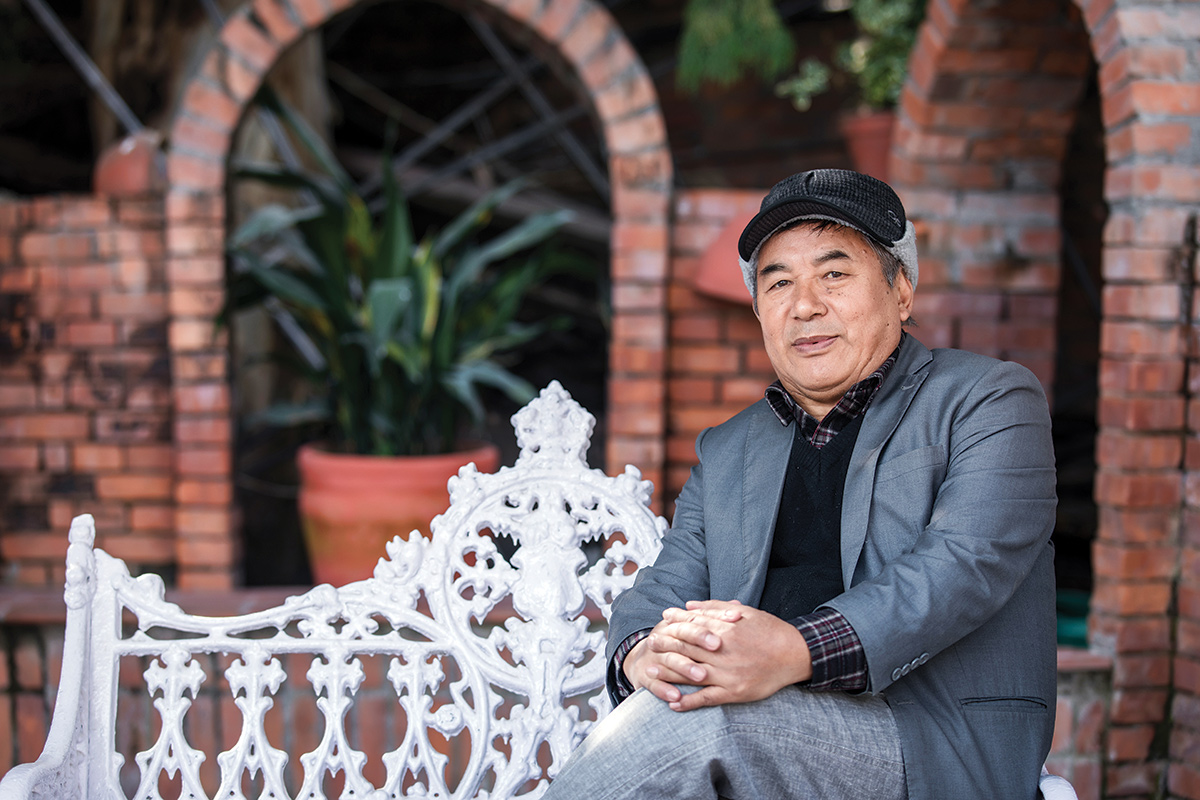
Background
Basnet was born in Lalitpur in 1964, to Surendra Bahadur Basnet and Asha Basnet. Growing up, Basnet says he enjoyed a childhood that was happy and well provided for. His father was a high ranking government official, was the youngest Chief Justice and the first Election Commissioner of Nepal, and also was elected minister numerous times. “Whatever I am today, I owe it to my father’s cultivation and motivation,” says he. Basnet did his schooling from Budhanilkantha School, and after finishing school, joined I Sc in Amrit Science College. “I enrolled in Science as my father wanted me to become an engineer. But it wasn’t destined for me. No matter how hard i tried, I couldn’t grasp chemistry and optional maths, I just couldn’t rationalize it,” recalls Basnet. So he dropped out and joined I Com in Banaras, and later did his B Com from Mahendra Morang College, Biratnagar. At the same time, he was also looking after his ancestral farm in Biratnagar. There he gained some experience in agriculture through fishery, banana and pineapple plantation and horticulture. After taking care of the farm for seven years, he returned back to Kathmandu and got married to Sunita Basnet Sijapati in 1989. Then they went back to the farm, but being brought up in Kathmandu, his wife couldn’t fit into the life in the farm. So the couple came back to Kathmandu, and Basnet then joined MA in Economics in TU. He also started a handicraft business and exported handicrafts and garments to USA.Story behind Buddha Air
Basnet was busy with his export business and regular affairs, but at the back of his head, he always wanted to do something substantial, and was thinking about such prospects. “Once, my brother-in-law, a pilot for the then RNAC, came to with and spoke about his plan of starting an airline. I was instantly attracted, and we immediately started working on the project,” recalls Basnet. It was more than two decades ago, when there were very few private airlines in operation, and some had even gone bankrupt. After much research, Basnet identified an aircraft, Beechcraft 1900D; a 19-seater aircraft from US based Raytheon Company. A single such aircraft’s price was Rs 300 million back then, and Basnet thought of buying two such aircrafts. 600 million rupees was a very huge amount, and for that, Basnet says he mortgaged all of his property and still was able to manage only 10 per cent of the total cost. “The aircraft company agreed to lease the remaining amount, and we finally acquired the two aircrafts,” says Basnet. Then he set up an office, and completed all the paperwork and licensing procedures. Though getting a licence was difficult, Basnet says CIAA and other related authorities were very helpful as the airlines sector had become stagnant. “We had done a good feasibility study, and we were encouraged by the authorities too, so there was no hassle in getting the license,” says Basnet. After fulfilling all the requirements, Buddha Air made its first commercial flight on 11th October, 1997.
Moving Ahead
Till 2007, Buddha Air operated through a fleet of seven aircrafts, all of which were 19-seaters. “We had good coverage throughout Nepal and the business was going all well. Then we started to face some competition from other airlines operating through larger aircrafts with more seats,” says Basnet. So in 2008, the company bought two ATR 42-320 aircrafts, which were 42- seaters, and in 2010, an ATR 72-500, a 72-seater aircraft. “After the addition of new higher-capacity aircrafts, we didn’t only face the competition, we took over the competition,” say he.Present Times
According to Basnet, for the five years, Buddha Air suffered losses, but after that, the company has been in profit every single year. “As I see the current state of affairs, we will be in profit for the next five years regardless of the competition,” says a confident Basnet. Today, Buddha Air has a fleet of nine aircrafts, and controls 65 per cent of the total market. The airline covers 10 destinations in Nepal, and also flies to Banaras as an international destination. Basnet says that the strength of his company is his employees, whom he likes to address as co-workers.”I have 800 co-workers working with me, and we all are benefitting from the company. Buddha Air is not only my property, it belongs to all of us, and all my co-workers have a sense of ownership,” says he.CSR
“I dream of a society, a nation, with tranquillity and equitable wealth creation without any disparity. We need people to create wealth equitably, and agriculture is the best solution for that in Nepal,” says Basnet. So apart from business, he is mostly involved in an agricultural project in Terai, in Morang and Sunsari districts. “I believe that CSR should not be parasitic, I want it to sustainable,” says Basnet. Under the CSR of Budhha Air, he is commercially optimizing paddy farming in Terai. “Subsistence paddy farming needs to be commercialized, for the economic growth of Nepal. The price of land is increasing, and farmers are discouraged from agriculture as traditional farming methods give less outcome and pays vey less. Therefore, the sector needs to be commercialized,” says Basnet. According to him, the macroeconomic development of Nepal is dependent on agriculture, and it can only be achieved through commercialized agriculture. According to him, if a farmer is making 5,000 rupees per hectare, through commercial farming, the same farmer can make more than 80,000 rupees. If all the households come in the process, all the households’ wealth will be exponentially increased. “I want the farmers to participate in all the processes involved, like farming, processing refining and even supply and distribution. I want to supply quality rice from the farmer to the customers’ doorstep, without any middlemen, which will reduce the price as well, and help farmers earn significantly more,” explains Basnet.
The project has created a new system, and it is ongoing in four VDCS of Sunsari. “We have replaced the labour-intensive processes like plantation and harvesting, and it has all now been mechanized. Owing to this new project, the paddy production has increased significantly,” says he. According to him, the average production in Terai was 3.2 tonne per hectare, and now it has gone up to 9 tonnes per hectare. All this is done through Nepal Krishi Company, an entity under Buddha Air’s CSR. The project is going on in 300 hectares of land at present, and within a few years, Basnet wants to spread it over 2,700 hectares.
“Farmers are attracted to this project as the cost of production has gone down by 50 per cent, productivity is three times higher and harvesting time is reduced by a huge amount,” says he. According to Basnet, the entire process will substitute the import of rice worth 32-25 billion rupees within a few years. Basnet has been working in this sector for the past decade, and has contributed more than sixty million rupees.
According to him, if a farmer is making 5,000 rupees per hectare, through commercial farming, the same farmer can make more than 80,000 rupees. If all the households come in the process, all the households’ wealth will be exponentially increased. “I want the farmers to participate in all the processes involved, like farming, processing refining and even supply and distribution. I want to supply quality rice from the farmer to the customers’ doorstep, without any middlemen, which will reduce the price as well, and help farmers earn significantly more,” explains Basnet.
The project has created a new system, and it is ongoing in four VDCS of Sunsari. “We have replaced the labour-intensive processes like plantation and harvesting, and it has all now been mechanized. Owing to this new project, the paddy production has increased significantly,” says he. According to him, the average production in Terai was 3.2 tonne per hectare, and now it has gone up to 9 tonnes per hectare. All this is done through Nepal Krishi Company, an entity under Buddha Air’s CSR. The project is going on in 300 hectares of land at present, and within a few years, Basnet wants to spread it over 2,700 hectares.
“Farmers are attracted to this project as the cost of production has gone down by 50 per cent, productivity is three times higher and harvesting time is reduced by a huge amount,” says he. According to Basnet, the entire process will substitute the import of rice worth 32-25 billion rupees within a few years. Basnet has been working in this sector for the past decade, and has contributed more than sixty million rupees.
Future
Apart from commercializing agriculture, Basnet has plans of redefining the tourism industry of Nepal. “We will operate international flights from the upcoming Pokhara International Airport through Jet Airliners liner in the future. We will be flying to the entire Indian subcontinent, Malaysia, Thailand, and Dubai among others,” shares Basnet. Basnet also wants to change the tourism-mix from adventure tourism to leisure tourism with premium tourists. He says that sustainable employment is the most important thing needed for the stability of Nepal, and only tourism can deliver that. “After I fulfill these dreams of mine, I want to retire. I believe that entrepreneurship is leadership. It has to evolve, and after it reaches its peak, leadership should be transferred over to the next generation, and it has to be a continuous process,” says Basnet.
Personal Side
Basnet is an avid reader, and loves to read, specially the books on psychology. Whenever he is free, he spends his time with his family, with his wife and two daughters Arju and Astha. “For vacations, I used to go overseas, but lately I prefer travelling within Nepal, and I want to travel more within Nepal,” says he.Advice
Basnet suggests that new entrepreneurs should be innovative and think outside of the box. “You can’t replicate what others are doing and expect to be successful, innovation is most important thing,” advices he. He also emphasises on having integrity and patience. According to him, there are no shortcuts to success, you must work hard, and always work by the book. And for enterprises to last, Basnet opines that entrepreneurs shouldn’t treat it as their own, but rather as a participatory organization.
Published Date: April 27, 2017, 12:00 am
Post Comments
E-Magazine
RELATED In the Lead



-1738054013.jpg)
-1735633677.jpg)